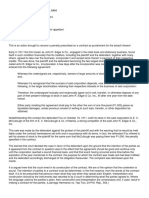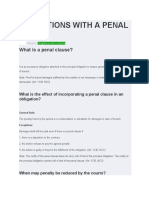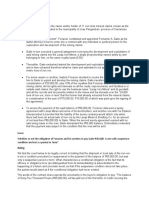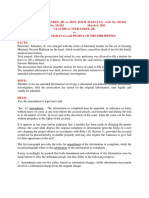LAMBERT V FOX
LAMBERT V FOX
Uploaded by
Dan Marco GriarteCopyright:
Available Formats
LAMBERT V FOX
LAMBERT V FOX
Uploaded by
Dan Marco GriarteOriginal Title
Copyright
Available Formats
Share this document
Did you find this document useful?
Is this content inappropriate?
Copyright:
Available Formats
LAMBERT V FOX
LAMBERT V FOX
Uploaded by
Dan Marco GriarteCopyright:
Available Formats
LAMBERT v.
FOX
the plaintiff and the defendant are the two largest stockholders in the new corporation called
John R. Edgar & Co., Incorporated.
A few days after the incorporation was completed plaintiff and defendant entered into the
following agreement:
Therefore, the undersigned mutually and reciprocally agree not to sell, transfer, or otherwise
dispose of any part of their present holdings of stock in said John R. Edgar & Co. Inc., till
after one year from the date hereof.
Either party violating this agreement shall pay to the other the sum of one thousand (P1,000)
pesos as liquidated damages, unless previous consent in writing to such sale, transfer, or
other disposition be obtained.
Notwithstanding this contract the defendant Fox on October 19, 1911, sold his stock in the
said corporation to E. C. McCullough of the firm of E. C. McCullough & Co. of Manila, a
strong competitor of the said John R. Edgar & Co., Inc.
This sale was made by the defendant against the protest of the plaintiff and with the warning
that he would be held liable under the contract hereinabove set forth and in accordance with
its terms. In fact, the defendant Foz offered to sell his shares of stock to the plaintiff for the
same sum that McCullough was paying them less P1,000, the penalty specified in the
contract.
The appellee urges that the plaintiff cannot recover for the reason that he did not prove
damages, that a penalty, as such, will not be enforced and that the party suing, in spite of the
penalty assigned, will be put to his proof to demonstrate the damages actually suffered by
reason of defendants wrongful act or omission.
RULING:
penalties provided in contracts of this character are enforced . It is the rule that
parties who are competent to contract may make such agreements within the
limitations of the law and public policy as they desire, and that the courts will enforce
them according to their terms
The only case recognized by the Civil Code in which the court is authorized to
intervene for the purpose of reducing a penalty stipulated in the contract is when the
principal obligation has been partly or irregularly fulfilled and the court can see that the
person demanding the penalty has received the benefit of such or irregular performance. In
such case the court is authorized to reduce the penalty to the extent of the benefits
received by the party enforcing the penalty.
In this jurisdiction, there is no difference between a penalty and liquidated damages,
so far as legal results are concerned. Whatever differences exists between them as a
matter of language, they are treated the same legally. In either case the party to whom
payment is to be made is entitled to recover the sum stipulated without the necessity
of proving damages. Indeed one of the primary purposes in fixing a penalty or in
liquidating damages, is to avoid such necessity.
You might also like
- CCDC2Document33 pagesCCDC2Sandy WangNo ratings yet
- With The Payment of Damages in Either Case. He May Also Seek Rescission, Even After HeDocument2 pagesWith The Payment of Damages in Either Case. He May Also Seek Rescission, Even After HeSean ArcillaNo ratings yet
- STONE INTERACTIVE VENTURES LLC Vs Electronic ArtsDocument34 pagesSTONE INTERACTIVE VENTURES LLC Vs Electronic ArtssegmentnextdotcomNo ratings yet
- FB Biometrics FilingDocument74 pagesFB Biometrics Filingjeff_roberts881No ratings yet
- Lambert v. Fox, G.R. No. 7991, 29 Jan. 1914.Document3 pagesLambert v. Fox, G.R. No. 7991, 29 Jan. 1914.Sab SalladorNo ratings yet
- Lambert vs. Fox., 26 Phil., 588, No. 7991 January 29, 1914Document4 pagesLambert vs. Fox., 26 Phil., 588, No. 7991 January 29, 1914Claudia LapazNo ratings yet
- Right To Transfer of ShareholdingsDocument4 pagesRight To Transfer of ShareholdingscjadapNo ratings yet
- 1-Lambert VS FoxDocument4 pages1-Lambert VS FoxRenEleponioNo ratings yet
- G.R. No. L-7991 January 29, 1914Document3 pagesG.R. No. L-7991 January 29, 1914Tovy BordadoNo ratings yet
- Evidence Digests Vi and ViiDocument20 pagesEvidence Digests Vi and ViiJesús LapuzNo ratings yet
- Lambert v. FozDocument3 pagesLambert v. FozZazaNo ratings yet
- G.R. No. 7991 - Lambert v. FoxDocument5 pagesG.R. No. 7991 - Lambert v. FoxMaxxNo ratings yet
- Lambert v. FoxDocument3 pagesLambert v. FoxAlyssa Marie SobereNo ratings yet
- VI. Interpretation of DocumentsDocument4 pagesVI. Interpretation of DocumentsBeryl Joyce BarbaNo ratings yet
- Evidence - InterpretationDocument10 pagesEvidence - InterpretationKaren Gina DupraNo ratings yet
- Lambert Vs FoxDocument1 pageLambert Vs FoxRal PonteNo ratings yet
- Oblicon Novation CasesDocument4 pagesOblicon Novation CasesGio TriesteNo ratings yet
- Lambert Vs FoxDocument2 pagesLambert Vs FoxCharles Roger RayaNo ratings yet
- Javier vs. Court of Appeals and Leonardo Tiro Art. 1181, Suspensive Condition FactsDocument7 pagesJavier vs. Court of Appeals and Leonardo Tiro Art. 1181, Suspensive Condition FactsKatrina Vianca DecapiaNo ratings yet
- Buenaventura Angeles v. Ursula Torres CalasanzDocument2 pagesBuenaventura Angeles v. Ursula Torres CalasanzArjane Aram SamaniegoNo ratings yet
- Bortikey vs. AFP Retirement and Separation BenefitsDocument3 pagesBortikey vs. AFP Retirement and Separation BenefitsRon Acopiado100% (1)
- 3rd Report OTDocument24 pages3rd Report OTDeact AccountNo ratings yet
- Facts:: Behn, Meyer & Co. vs. Yangco, 38 Phil. 602Document4 pagesFacts:: Behn, Meyer & Co. vs. Yangco, 38 Phil. 602Phoebe MascariñasNo ratings yet
- Digest Set 3Document6 pagesDigest Set 3Basri JayNo ratings yet
- Serra vs. CADocument8 pagesSerra vs. CAaftb321No ratings yet
- Lawphil - G.R. No. L-43683 July 16, 1937Document6 pagesLawphil - G.R. No. L-43683 July 16, 1937Renzo JamerNo ratings yet
- Joseph v. Sps. JosephDocument2 pagesJoseph v. Sps. JosephjologsNo ratings yet
- Plaintiffs Avelina and Mariano Velarde (Herein Petitioners) For The Sale of Said Property, Which Was, However, Under LeaseDocument22 pagesPlaintiffs Avelina and Mariano Velarde (Herein Petitioners) For The Sale of Said Property, Which Was, However, Under LeaseThalia SalvadorNo ratings yet
- Philippine Economic Zone Authority (Peza) vs. Pilhino Sales Corp. G.R. No. 185765, September 28, 2016Document7 pagesPhilippine Economic Zone Authority (Peza) vs. Pilhino Sales Corp. G.R. No. 185765, September 28, 2016Mogsy PernezNo ratings yet
- Interpretation of Contracts 1Document4 pagesInterpretation of Contracts 1Enrico PeraltaNo ratings yet
- G.R. No. 209370, March 25, 2015 Fort Bonifacio Development Corp. v. FongDocument2 pagesG.R. No. 209370, March 25, 2015 Fort Bonifacio Development Corp. v. FongFiona FedericoNo ratings yet
- 15 Sanchez Vs RigosDocument3 pages15 Sanchez Vs RigosjohnNo ratings yet
- 117662-2000-Spouses Litonjua v. L R Corp.Document10 pages117662-2000-Spouses Litonjua v. L R Corp.Christine Ang CaminadeNo ratings yet
- Laperal vs. Solid HomesDocument2 pagesLaperal vs. Solid HomesGeimmo SNo ratings yet
- Facts:: Verdejo vs. CADocument2 pagesFacts:: Verdejo vs. CAclaire beltranNo ratings yet
- Compiled Sales Case Digest - Batch 4Document15 pagesCompiled Sales Case Digest - Batch 4railey67No ratings yet
- StatconDocument26 pagesStatconshepaiiNo ratings yet
- Lim VSDocument6 pagesLim VSLoveAnneNo ratings yet
- Jose V Bagonghari - Answer - Case 1Document11 pagesJose V Bagonghari - Answer - Case 1Enrryson SebastianNo ratings yet
- Oblicon DigestsDocument32 pagesOblicon DigestsjaysonadangalawschoolNo ratings yet
- Contracts Case DigestDocument11 pagesContracts Case Digest8smjg49266No ratings yet
- Unjust EnrichmentDocument8 pagesUnjust EnrichmentDm Witney Jeson100% (1)
- Uy v. CA, 314 SCRA 69, September 9, 1999Document3 pagesUy v. CA, 314 SCRA 69, September 9, 1999catrina lobatonNo ratings yet
- CONSOLACION Vs MaybankDocument3 pagesCONSOLACION Vs MaybankssNo ratings yet
- Reviewer ContractsDocument6 pagesReviewer ContractsBernard de AsisNo ratings yet
- 53 Angel Jose Warehousing V Chelda EnterprisesDocument6 pages53 Angel Jose Warehousing V Chelda Enterprisesjuan aldaba100% (1)
- Digests Art 1191-1232Document7 pagesDigests Art 1191-1232Gino LascanoNo ratings yet
- Oblicon DigestsDocument5 pagesOblicon DigestsMitsuko OgatisNo ratings yet
- Ferrazzini v. Gsell, (45 Phil. 697) FACTS: On A Friday Evening at Supper, Plaintiff TogetherDocument26 pagesFerrazzini v. Gsell, (45 Phil. 697) FACTS: On A Friday Evening at Supper, Plaintiff TogetherTed CastelloNo ratings yet
- TortDocument19 pagesTortLays RdsNo ratings yet
- Obligations With A Penal ClauseDocument7 pagesObligations With A Penal Clausejustine100% (1)
- ROBES (Revise)Document2 pagesROBES (Revise)luis capulongNo ratings yet
- ROBES (Revise)Document2 pagesROBES (Revise)luis capulongNo ratings yet
- Robes-Francisco Realty & Development Corporation vs. Lollita MillanDocument2 pagesRobes-Francisco Realty & Development Corporation vs. Lollita Millanluis capulongNo ratings yet
- GEORGE C. FONG, Petitioner, vs. JOSE V. DUEÑAS, Respondent.Document5 pagesGEORGE C. FONG, Petitioner, vs. JOSE V. DUEÑAS, Respondent.Gab EstiadaNo ratings yet
- Fucko Blic OnDocument18 pagesFucko Blic OnMark De JesusNo ratings yet
- Allied BankDocument3 pagesAllied BankAyamae ElizanNo ratings yet
- Lipnica Obligations and Contracts MidtermDocument12 pagesLipnica Obligations and Contracts MidtermedgepusoNo ratings yet
- Mercantile Insurance Co VsDocument3 pagesMercantile Insurance Co VsBuenavista Mae BautistaNo ratings yet
- PH Credit Vs CADocument3 pagesPH Credit Vs CAOrlando DatangelNo ratings yet
- Life, Accident and Health Insurance in the United StatesFrom EverandLife, Accident and Health Insurance in the United StatesRating: 5 out of 5 stars5/5 (1)
- Soccer (Football) Contracts: An Introduction to Player Contracts (Clubs & Agents) and Contract Law: Volume 2From EverandSoccer (Football) Contracts: An Introduction to Player Contracts (Clubs & Agents) and Contract Law: Volume 2No ratings yet
- Lavides V CADocument1 pageLavides V CADan Marco GriarteNo ratings yet
- 13th Month PayDocument2 pages13th Month PayDan Marco GriarteNo ratings yet
- Issue: Whether Article 1381 (4) of The Civil Code Applies Only When There Is Already A Prior Judicial Decree On WhoDocument1 pageIssue: Whether Article 1381 (4) of The Civil Code Applies Only When There Is Already A Prior Judicial Decree On WhoDan Marco GriarteNo ratings yet
- Serapio v. Sandiganbayan, 396 SCRA 443 (2003)Document2 pagesSerapio v. Sandiganbayan, 396 SCRA 443 (2003)Dan Marco GriarteNo ratings yet
- NAGA TELCO V CADocument2 pagesNAGA TELCO V CADan Marco GriarteNo ratings yet
- Land Bank of The Philippines V Belle CorpDocument2 pagesLand Bank of The Philippines V Belle CorpDan Marco GriarteNo ratings yet
- Lazatin V DisiertoDocument2 pagesLazatin V DisiertoDan Marco GriarteNo ratings yet
- PARKS V TARLACDocument1 pagePARKS V TARLACDan Marco GriarteNo ratings yet
- GAITE V FONACIERDocument2 pagesGAITE V FONACIERDan Marco GriarteNo ratings yet
- Burgs v. COSDocument2 pagesBurgs v. COSDan Marco GriarteNo ratings yet
- CPU v. CADocument2 pagesCPU v. CADan Marco GriarteNo ratings yet
- Clause As Contemplated in Art. 1226?Document1 pageClause As Contemplated in Art. 1226?Dan Marco GriarteNo ratings yet
- Spouses Velarde v. Court of Appeals, G.R. No. 108346 (11 July 2001)Document1 pageSpouses Velarde v. Court of Appeals, G.R. No. 108346 (11 July 2001)Dan Marco GriarteNo ratings yet
- Case Number: Date: Provisions & Related Concepts/Doctrines: Tenebro vs. CA, G.R. No. 150758. February 18, 2004Document3 pagesCase Number: Date: Provisions & Related Concepts/Doctrines: Tenebro vs. CA, G.R. No. 150758. February 18, 2004Dan Marco GriarteNo ratings yet
- Araullo V. Aquino G.R. No. 209287, July 1, 2014 FactsDocument2 pagesAraullo V. Aquino G.R. No. 209287, July 1, 2014 FactsDan Marco GriarteNo ratings yet
- Marquez v. Elisan Credit Corporation, G.R. No. 194642 (6 April 2015)Document1 pageMarquez v. Elisan Credit Corporation, G.R. No. 194642 (6 April 2015)Dan Marco GriarteNo ratings yet
- Fong V DuenasDocument1 pageFong V DuenasDan Marco GriarteNo ratings yet
- Swire Realty Development Corporation v. Yu, G.R. No. 207133 (9 March 2015)Document1 pageSwire Realty Development Corporation v. Yu, G.R. No. 207133 (9 March 2015)Dan Marco GriarteNo ratings yet
- Case DigestDocument1 pageCase DigestFidelis AijouNo ratings yet
- Tarrif Cases PhilippinesDocument12 pagesTarrif Cases PhilippinesGodofredo SabadoNo ratings yet
- Cruz Agana V Santiago LagmanDocument3 pagesCruz Agana V Santiago LagmanJennyNo ratings yet
- Enforcement of Foreign Arbitral Awards in India: M Ittv of HatoiDocument216 pagesEnforcement of Foreign Arbitral Awards in India: M Ittv of HatoiMAHANTESH GNo ratings yet
- Filipinas College V TimbangDocument5 pagesFilipinas College V Timbangmarie janNo ratings yet
- Manzanilla V WaterfieldsDocument2 pagesManzanilla V WaterfieldsTina BNo ratings yet
- Unit 2 LOC-II: by Harish Tiwari Assistant ProfessorDocument14 pagesUnit 2 LOC-II: by Harish Tiwari Assistant ProfessorcharuNo ratings yet
- Ching V Cheng DigestDocument3 pagesChing V Cheng DigestFrankel Gerard MargalloNo ratings yet
- United States Court of Appeals, Tenth CircuitDocument5 pagesUnited States Court of Appeals, Tenth CircuitScribd Government DocsNo ratings yet
- Philippine Sinter Corporation and Phividec Industrial Authority Vs Cagayan Electric Power and Light Co IncDocument1 pagePhilippine Sinter Corporation and Phividec Industrial Authority Vs Cagayan Electric Power and Light Co IncJa Ru100% (2)
- Forcible EntryDocument1 pageForcible EntryNadine BediaNo ratings yet
- Cases - Special Civil ActionsDocument507 pagesCases - Special Civil ActionsShalena Salazar-SangalangNo ratings yet
- Supreme Court Judgement.Document27 pagesSupreme Court Judgement.Sree Vidyaprakasini SabhaNo ratings yet
- Essentials of The Specific Relief ACT, 1963Document34 pagesEssentials of The Specific Relief ACT, 1963Abhimanyu SinghNo ratings yet
- Criminal Procedure Case DigestDocument2 pagesCriminal Procedure Case DigestAly ConcepcionNo ratings yet
- Ra 9176Document8 pagesRa 9176Jenny Lyn MahinayNo ratings yet
- Transportation Law Digest CompilationDocument41 pagesTransportation Law Digest CompilationRafael JohnNo ratings yet
- United States v. Jesus Campos, 4th Cir. (2011)Document3 pagesUnited States v. Jesus Campos, 4th Cir. (2011)Scribd Government DocsNo ratings yet
- Mock Trial Info Sheet 2014-2015Document1 pageMock Trial Info Sheet 2014-2015Bilal SheriffNo ratings yet
- DOCENA VS Lapesura DigestDocument2 pagesDOCENA VS Lapesura Digestproject_ziNo ratings yet
- Coca-Cola VS CaDocument6 pagesCoca-Cola VS CaporeoticsarmyNo ratings yet
- JUPITER Guru in HousesDocument2 pagesJUPITER Guru in HousesSaubhagya KarNo ratings yet
- BPI v. Eduardo HongDocument7 pagesBPI v. Eduardo Hongkim colardoNo ratings yet
- Maersk Line vs. Court of Appeals, 222 SCRA 108, G.R. No. 94761 May 17, 1993Document8 pagesMaersk Line vs. Court of Appeals, 222 SCRA 108, G.R. No. 94761 May 17, 1993Sam WelbyNo ratings yet
- AL-MALIKI Et Al v. BUSH Et Al - Document No. 6Document11 pagesAL-MALIKI Et Al v. BUSH Et Al - Document No. 6Justia.com100% (2)
- Republic Bank vs. Ebrada GR L-40796, 31 July 1975: - ForgeryDocument3 pagesRepublic Bank vs. Ebrada GR L-40796, 31 July 1975: - ForgeryptbattungNo ratings yet










































































































